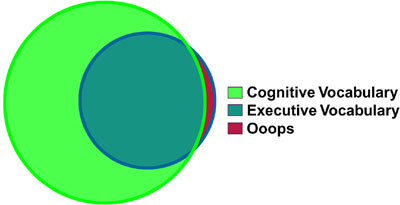Writing Tip
Use Words That Maximize Your Reliability
Difficulty Level: Basic
Recommendation: Choose words for optimal effect.
Part of learning your craft—engineering or whatever—is developing a robust vocabulary so that you can talk intelligently about your work, so that you can precisely convey content. But there is a fine line between jargon—which has a deeply rooted connotation that words are being used to elevate the writer—and technical discourse—which is required to talk about technical things.
Technical discourse is elastic: The author can adjust the level of technical detail to suit the audience so that he does not manifest himself as a snob. Talk too plain, and you don’t share the technical language of your audience. Talk too fancy, and you alienate them.
Vocabulary comes in two varieties: cognitive and executive, as shown in the Venn diagram below. The green vocabulary represents the words we know but seldom use. The blue vocabulary represents the words we know and use with facility. The sliver of red represents words that we don't really know but use (an example of this is Latin scholarly abbreviations, such as “i.e.” and “e.g.,” which people often get confused, or “nominal,” which is often misused).

For maximum thought transfer, use the reader’s executive vocabulary (based mostly on intuition, so you don’t have to poll your readers). For maximum impression, use words they know but don’t typically use, but be careful about sounding pedantic (there’s a word people seldom use). However, just because a word is known to the reader and has a low frequency count (how often it is used) does not mean it’s impressive. “Popcorn” has a low frequency count, but trotting it out in a report won’t impress your reader.
The idea of impressing your reader might seem superficial, but it is a good way to build a reliable “implied author.” An implied author is the idea of the author that emerges from the automatic reading process. A strong determinant of a reliable implied author is the genuine author’s command of language, which establishes authority.
Sometimes, an elevated language can alienate the reader. For example, a few pundits come to mind: The late Christopher Hitchens and William F. Buckley Jr., George Will. But it doesn't have to be that way, even with complex or obscure subjects. Consider Noam Chomsky, the venerated MIT linguist whose theories on modern linguistics transformed the way researchers frame their linguistic studies. Without fail, his language is direct and plain, even when he discusses overtly complex subjects. He uses impressive words, but we know what they are (we just can’t conjure them so glibly as Chomsky).
You, the technical writer, are accountable to the reader. That means that what you say, how you say it, how consistent you are, how clear you are all reflect upon the implied author. “Sounding good” is important, so thoughtfully picking your words must be, too.